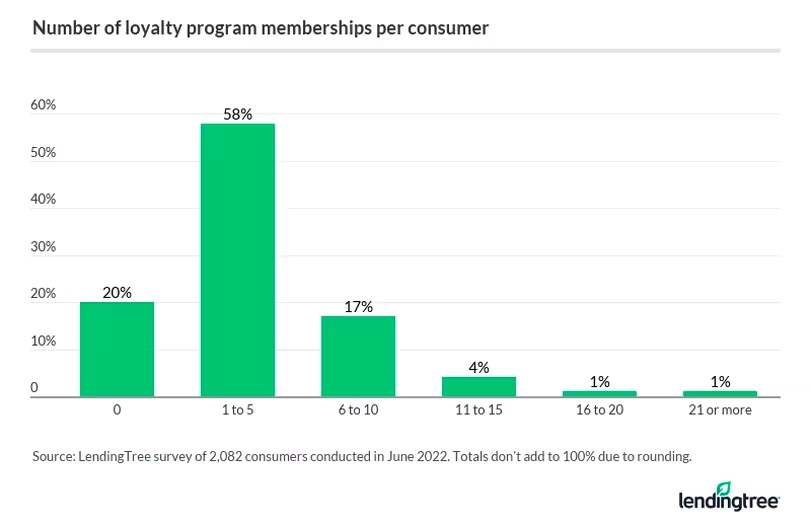Lufthansa, Nike…Blockchain will transform loyalty programs | CoinDesk JAPAN

Evolving loyalty program
Why are the biggest brands and most successful entrepreneurs looking to reinvent their loyalty programs with blockchain?
Loyalty plans such as purchase rewards have existed since the 1790s, but American Airlines is said to have launched the modern loyalty program in 1981 with the introduction of its AAdvantage frequent flyer program.
Since then, 80% of Americans are members of at least one membership or loyalty program. The numbers are similar for Gen Z, with 70% participating in these programs to receive special rewards and perks.
So, with a program that has been proven for over 40 years, why are big brands and successful developers looking to leverage blockchain solutions to further enhance their loyalty and reward offerings? I wonder?


(From a survey of 2082 people conducted by LendingTree in 2022)
In 2023, we started to see consumer backlash as brands tried to demand more from consumers by offering perks that were previously considered standard.
For example, Delta Air Lines issued an apology after receiving intense backlash for raising the minimum spend and number of flights needed to qualify for the lowest level of benefits.
In the words of Marc Mathieu of CRM giant Salesforce, “Rather than trying to extract the most value from their best customers, brands should think about ways to reward them and make them feel special.†It became a situation where I thought, “I should.â€
To take it a step further, what if there was a brand-owned and operated, social and experiential-friendly system that rewarded different behaviors? That’s where blockchain comes in.
One of the best use cases for blockchain is loyalty and rewards, and there are a few big reasons why.
- Transparency: All transactions on the blockchain can be viewed transparently by any authorized party, increasing trust among users.
- Security: Blockchain uses encryption technology, and once a transaction is added to the ledger, it cannot be changed or deleted.
- Interoperability: Blockchain allows different loyalty programs to interoperate. Customers may be able to transfer and integrate benefits from different programs, leading to an improved user experience (UX).
Among other benefits, these features open up new opportunities for consumers and, for forward-thinking brands, can grow their loyalty programs into multi-use ecosystems.
Examples of brand usage
Let’s take a look at brands that are working on blockchain-powered loyalty programs.
â– Lufthansa
Major European airline Lufthansa has introduced Uptrip, an application that allows users to collect NFTs through actions such as scanning boarding passes and redeem them for benefits such as flight upgrades and access to airport lounges. Although it is still in beta, more than 20,000 people have already registered.
â– Nike
Nike has announced a digital sneaker collection that gives owners various benefits. Our Force 1 digital sneakers are available for under $20.
Not only will holders receive assets that can be added to the feet of their favorite video game characters, but they can also unlock secret levels in the popular online game Fortnite. Furthermore, a collaboration with EA Sports, a game brand specializing in sports games, was also announced.
Additionally, holders can purchase physical sneakers that are only available to holders. Approximately 100,000 digital shoes were purchased upon release.
â– Blackbird
Entrepreneur Ben Leventhal has launched a new venture called Blackbird. Blackbird enables restaurants and customers to build relationships together through a point system powered by the crypto asset FLY.
After a pilot test in New York, Leventhal plans to expand, focusing on helping restaurants rediscover who their best customers are and sharing that data with like-minded restaurants. is placed. Blackbird has raised $24 million in Series A funding from investors including American Express and Andreessen Horowitz (a16z).
In addition to the brands mentioned above, brands from LVMH to Starbucks are exploring how they can use blockchain-based tools to connect more deeply with their customers.
Additionally, established operators and forward-thinking entrepreneurs see opportunity in helping traditional businesses go on-chain, and the industry evolves to meet the needs of legacy and emerging brands. There is.
Service providers such as Forum3, Co:Create, Mojito, and Superlogic are pioneering new areas of on-chain loyalty. The question is whether this new decentralized paradigm is better than Web2’s faltering centralized databases.
For this new consumer technology to be widely adopted, user experience issues, adoption curves, and, frankly, branding issues surrounding crypto assets need to be resolved.
Given the potential for better privacy protection for consumer data, shared goals for both brands and consumers, and permissionless collaboration between brands, it’s safe to say we have something to look forward to. .
|Translation and editing: Akiko Yamaguchi, Takayuki Masuda
|Image: Shutterstock
|Original text: Crypto for Advisors: Innovating Legacy Programs with Blockchain
The post Lufthansa, Nike…Blockchain will transform loyalty programs | CoinDesk JAPAN appeared first on Our Bitcoin News.